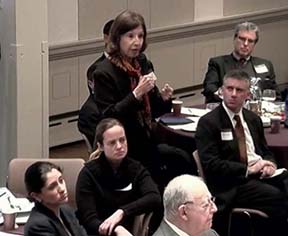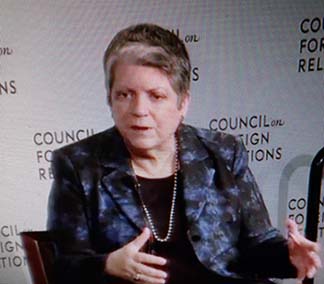By Lucy Komisar
Jan 29, 2015
Even out of office, U.S. officials routinely evade crucial questions about U.S. policy. Here is Janet Napolitano, former head of the U.S. Dept of Homeland Security, 2009-13, also former Gov. of Arizona, at the Council on Foreign Relations Jan 29th side-stepping a serious question about U.S. policy in the era of cyber-war.
She spoke at a Home Box Office History Makers Series “on the contributions made by a prominent individual at a critical juncture in international relations.” Given her answer to this question, which measures intellectual and political honesty, we have to think, “maybe not so much.”

QUESTION: I’m Lucy Komisar. I’m a journalist. On the one hand, we’ve had a lot of problems of failures of cyber-security. On the other hand, the U.S. has worked to weaken security standards and also demanded back doors so it can get into cyberspace.
So, is this a contradiction?
And do you think now that the danger of cyber — of failures of cyber-security are so important that the U.S. should revisit its policy and try to make cyber-security internationally as strong as it possibly can?
She doesn‘t answer the question about U.S. policy. Instead, we get gobbledegook.
NAPOLITANO: I think that what the world will require, if we can ever get there, to where cyber is concerned, is a — an international compact of nations, an international convention of some sort, that at least begins to grapple with some of the issues you just talked about and that at least begins to figure out what levels of government need to intersect with — you know who needs to intersect with whom, where, and what some of the rules of engagement should be.

What is a proportionate response? How do you do a proportionate response in cyberspace that doesn’t touch other countries or other regions of the world? All of those things.
It’s difficult right now, with the current state of affairs, to see that kind of a global consensus developing, although people are beginning quietly or beginning to think about it. But it seems to me you cannot grapple with cyber-security as one nation by itself. It is an inherently international phenomenon.
Should the U.S. change its policy of weakening cyber-security for its own purposes, because it has made dangerous international hacking easier? Napolitano is now President of the University of California. She could have used this platform to deal with an issue that is now widely discussed in the cyber, civil liberties and civil communities.
But the notion of intellectual honesty universities are supposed to imbue has apparently not overwhelmed her political instincts. Which means, don’t stick your neck out, protect your flank, because maybe you could get another good government job. Or at least an appointment to a government commission aimed at making no change. Pity.
CFR transcript.
Video. Question starts 42 minutes in.


Thank you for documenting Janet Napolitano’s view on cybersecurity by your question. Her response reminds me of the oft quoted (by military men etc.) dictum: si vis pacem para bellum (if you want peace, prepare for war). And your comment, of the opposite: if you want peace, prepare for peace.
Btw, in the ca 1 hour video from CFR, LK:s question comes at ca 40 min.